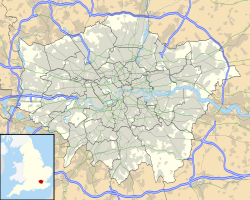Lumley Chapel
| Lumley Chapel | |
|---|---|

Lumley Chapel from the southeast
|
|
| Coordinates: 51°21′38″N 0°12′58″W / 51.3606°N 0.2161°W | |
| OS grid reference | TQ 243 638 |
| Location |
Cheam, London Borough of Sutton |
| Country | England |
| Denomination | Anglican |
| Website | Churches Conservation Trust |
| History | |
| Former name(s) | St Dunstan's Church, Cheam |
| Dedication | Saint Dunstan |
| Architecture | |
| Functional status | Redundant |
| Heritage designation | Grade II* |
| Designated | 28 August 1953 |
| Architectural type | Church |
| Style | Norman, Gothic |
| Closed | 1864 |
| Specifications | |
| Materials |
Roughcast stone and brick Tiled roof |
The Lumley Chapel is a redundant Anglican church in the suburban village of Cheam, in the London Borough of Sutton, England. It is recorded in the National Heritage List for England as a designated Grade II* listed building, and is under the care of the Churches Conservation Trust. The chapel is located in the churchyard of St Dunstan's Church in Church Road, off Malden Road, the A2043.
The Archbishop of Canterbury acquired the manor of Cheam in 1018, and it is thought that the church was founded soon after this date. It was dedicated to Saint Dunstan, an earlier Archbishop of Canterbury. south aisle was added to the church in the 12th century. In 1580 John Lumley, 1st Baron Lumley inherited the nearby Nonsuch Palace through his marriage to Jane Fitzalan, daughter of Henry FitzAlan, 19th Earl of Arundel. During the 1590s Lumley converted the church into a memorial chapel for himself and his two wives.
In the early 18th century the church consisted of a chancel with a south chapel, a nave with a south aisle, and a west tower. Later in the century, possibly in 1746, the south aisle and the south wall of the nave were demolished and replaced by a wider nave. At the same time a north aisle and a south porch were added. In 1864 a new church, also dedicated to St Dunstan, was built to the north. The older church was demolished, other than the east end of the chancel which was retained to contain the monuments and brasses from the old church. This remnant of the former church was declared redundant on 16 June 2002, and was vested in the Churches Conservation Trust on 1 August 2002.
...
Wikipedia

